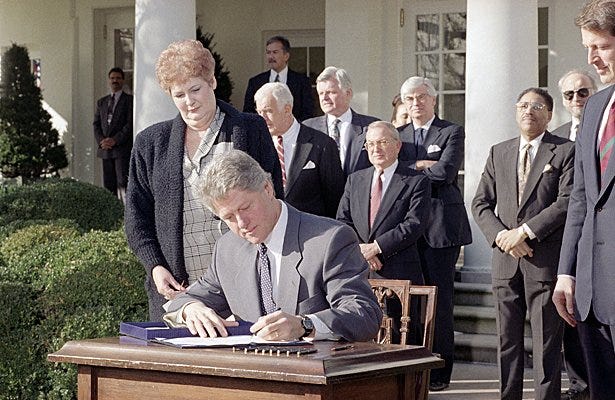Thirty years ago today, the Family and Medical Leave Act. Now it's time for paid leave.
Didn't we learn anything from the pandemic?
Friends,
Thirty years ago today, I stood behind Bill Clinton in the Rose Garden of the White House as he signed into law the Family and Medical Leave Act. The mood was festive. I remember thinking we’d been in office just two weeks and already were helping average working people. Nothing to it!
The Family and Medical Leave Act required that employers give their workers up to three months off for a family emergency or serious medical problem. As secretary of labor, I had the responsibility to implement it.
Business groups had lobbied hard against the bill, arguing it would undermine productivity, harm American competitiveness, and cost jobs. Labor unions, women’s groups, and progressive activists had fought back.
Now, sweet victory.
Only in America would such a struggle take on epic proportions. Out of 193 member nations of the United Nations, all but 11 guarantee their workers time off from their jobs for family or medical emergencies. And not 12 weeks of unpaid leave, but four months or more — with pay.
The only obligation this new legislation put on employers was to hire them back if the worker returned within 12 weeks. In reality, few families could even afford to take unpaid leave.
Fast forward 30 years.
More employers now voluntarily offer their employees paid sick leave. But the employees who get it tend to be high paid.
Even after the worst pandemic to hit America in more than a century, roughly 33 million American workers still have no paid sick leave from their employer — including most low-wage workers (see chart, below).
Yet research shows that paid sick leave is actually good for businesses.
For starters, paid leave attracts more workers to jobs and keeps them there longer — saving businesses the expenses of hiring and retraining.
It increases overall productivity. When workers get paid sick leave, they don't have to worry about reporting for work when they're feeling ill — meaning they're less stressed and more productive when on the job.
Plus it keeps workers safer by reducing the likelihood of on-the-job accidents and minimizing the spread of illness in the workplace.
Workers who aren't afraid of losing pay when sick are also more likely to see a doctor and avoid becoming sicker — meaning fewer sick days later on and fewer costly visits to emergency rooms. This also saves their employers money over the long term by lowering health insurance premiums.
So why aren't all businesses voluntarily offering paid sick leave to their workers? Because they're taking a narrow, short-term view. And many just don't trust their employees.
But this is costing them, and costing all of us.
If businesses don't provide paid medical and family leave voluntarily, they must be required to provide it by law.
Thirty years ago today, America became the last rich nation to guarantee its workers family and medical leave. But we’ve continued to lag behind. We require only that employers hire workers back, while other rich nations guarantee their workers paid leave for family and medical emergencies.
Didn’t we learn anything from the pandemic? Isn’t it time America guaranteed its workers paid leave?





What you hear from the opposition is “that’s communism” when, sadly, they don’t recognize the bones of slavery.
When will we learn? Employees are assets, not liabilities.